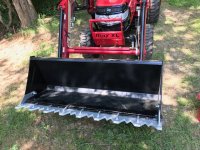Good report so far. Couple of thoughts: When you park the tractor, I wouldn't roll the bucket under itself like you show in the first pics. You can just put it flat with leading edge and underside tilted slightly off the ground to allow water to drain away, instead of sitting in the bucket.
The dealer did that to keep the rain out. Any particular reason not to?
As far as lynch pins, get a double headed plastic hammer, one end is soft, one is hard plastic. You can also get a pin puller with a curved end at most hardware/auto stores. Carry it, and multi point screwdriver and vice grip pliers and some other essential tools in a small ammo box type plastic toolbox, that you may find a place to bolt to the tractor. I also buy shop towels, a heavy duty paper towel product that comes in a big yellow box. They go a long way further than regular paper towels and are good for everything.
The double-headed plastic hammer sounds like great addition to the toolbox. Been using my foot.  Got the ammo box; future project to figure out how to bolt it on. SHOP TOWELS, already had them for the cars. Love them.
Got the ammo box; future project to figure out how to bolt it on. SHOP TOWELS, already had them for the cars. Love them.
Grease your zerks to the point of three handle pumps, OR when new grease can be seen coming out of the space between the areas being greased. Note if any refuse grease or are broken. Think of grease as the one thing that keeps metal to metal contact from happening at crucial joints. Without it things wear out quickly.
Use a grease pencil or indelible marker to mark tightened bolts for easy reference at a glance. Some bolts that loosen regularly may need a locktite product applied to keep this from happening.
Have a torque wrench on order and will do that, as many people have recommended.
Not only is your oil level important, your HST hydraulic fluid level is absolutely essential. It should always be clear with no foaming or milky color. Check it's level cold and on a level surface.
Also beware: if you ever have a hydraulic fluid leak,
NEVER use your hand, ONLY wood or cardboard to see where the leak is coming from. Fluid under pressure can enter one's skin, and worse case cause need for surgery. A rag is not enough protection against high pressure fluid. Find out exactly what fluid your tractor requires and keep some on hand for top off as needed. Do this when tractor is cold and level. Most HSTs require wet brake additives to be used in their fluids, but, YMMV.
I'd keep a box of extra filters for each item, oil filter, HST filter(s), fuel filter and air, from your selling dealer, or a place that can supply all for less $, as recommended by other Max owners here on TBN. Also some zerks too, and so forth.
Thank you, yes, it is on the list, to get "one of each" of the various fluids and easily replaced filters, etc. The hydro fluid level was fine; looked pretty clear. Engine oil in the glass jar looked light gray-blue, as you would expect during engine break-in.
Try not to let fitment issues get you down, but I would post pics before drilling your equipment. Sometimes things that are supposed to line up easy don't. There is usually a remedy short of drilling or beating something senseless to get them to fit.
Going to research is there is any way to raise the 3-point a little higher. I realize there still needs to be some "play" upwards to protect the mechanism I guess if you hit something.
Check your tire pressures all round to see where they are at.
Still confused on the proper tire pressure when they are filled with antifreeze. ?
In general go slow while the learning curve is steep, and when pushing forward through unknown ground be prepared to stop in case you encounter a buried rock or other obstacle that refuses to move by pushing it out of the ground. Loaders are more susceptible to damage from off angle pushing than most other pushing, like into a pile of sand, manure, etc. where there is most often little push back against the tractor hydraulics.
Thank you, yes, my common sense says go slow.
There's a lot to learn, go slow and enjoy. Engage and use 4WD whenever you think it would be useful. Don't engage it on the fly, and recognize it will make tight circles more difficult to turn.
Always watch your loader when lifting a load. Never allow yourself to be pulling back on the lever unless you're looking at the loader's position, it can rise too quickly to stop material from coming back at you if your're not paying close attention.
Keep your bucket as low as possible whenever possible, or remove it from the FEL. Be careful when crossing slopes and never make any fast turns when doing so. Know the ground under you when traversing, including holes, muddy slippery areas, etc. Wear your seatbelt and keep your ROPS upright. Have someone within earshot or radio call distance when working by yourself.
That's it for now. Meantime enjoy your new rig!:thumbsup:
When someone asks What's new? I whip it out.
